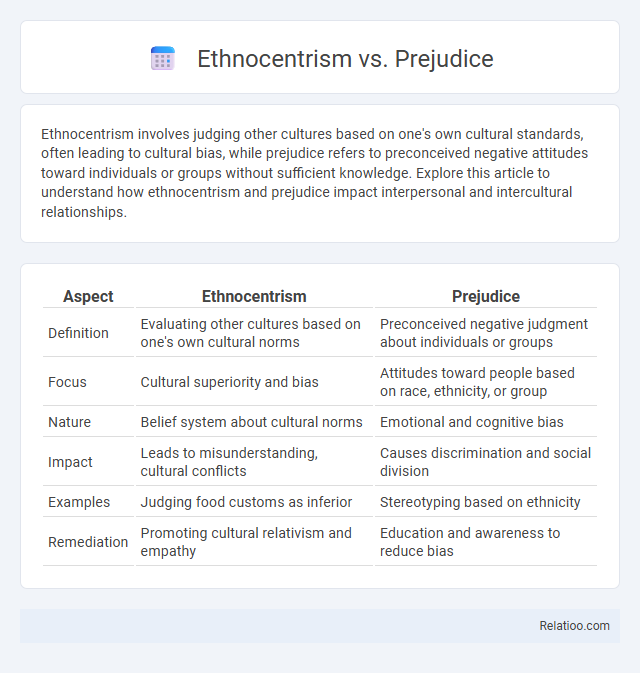Ethnocentrism involves judging other cultures based on one's own cultural standards, often leading to cultural bias, while prejudice refers to preconceived negative attitudes toward individuals or groups without sufficient knowledge. Explore this article to understand how ethnocentrism and prejudice impact interpersonal and intercultural relationships.
Table of Comparison
| Aspect | Ethnocentrism | Prejudice |
|---|---|---|
| Definition | Evaluating other cultures based on one's own cultural norms | Preconceived negative judgment about individuals or groups |
| Focus | Cultural superiority and bias | Attitudes toward people based on race, ethnicity, or group |
| Nature | Belief system about cultural norms | Emotional and cognitive bias |
| Impact | Leads to misunderstanding, cultural conflicts | Causes discrimination and social division |
| Examples | Judging food customs as inferior | Stereotyping based on ethnicity |
| Remediation | Promoting cultural relativism and empathy | Education and awareness to reduce bias |
Understanding Ethnocentrism: Definition and Core Concepts
Ethnocentrism is the belief in the inherent superiority of one's own ethnic group or culture, often leading to biased judgments and misunderstanding of other cultures. It differs from prejudice, which involves preconceived negative attitudes toward individuals or groups based on stereotypes, and from discrimination, which refers to actions taken based on prejudiced beliefs. Understanding ethnocentrism requires examining its role in shaping social identity, influencing intergroup relations, and contributing to cultural conflicts through the lens of in-group favoritism and out-group bias.
What is Prejudice? Key Characteristics Explored
Prejudice is a preconceived, often unfavorable judgment or opinion about individuals or groups based on characteristics such as race, ethnicity, religion, or nationality, without sufficient knowledge or reason. Key characteristics of prejudice include stereotyping, emotional bias, and resistance to change even when presented with new information. Unlike ethnocentrism, which centers on evaluating other cultures according to one's own cultural norms, prejudice involves an irrational and unfair attitude that can lead to discrimination and social exclusion.
Historical Roots of Ethnocentrism and Prejudice
Ethnocentrism and prejudice both stem from historical roots tied to group identity and social hierarchies, where early societies prioritized their own cultural norms and viewed outsiders as inferior or threatening. Ethnocentrism originated as a survival mechanism to maintain cultural cohesion, while prejudice evolved through power dynamics and systemic inequalities embedded in history. Understanding these roots helps you recognize how deeply ingrained biases influence present-day intergroup relations and social attitudes.
Ethnocentrism vs Prejudice: Main Differences
Ethnocentrism involves evaluating other cultures based on the standards of one's own culture, often leading to a belief in cultural superiority. Prejudice refers to preconceived opinions or attitudes toward individuals or groups, typically without factual basis and often rooted in stereotypes. The main difference lies in ethnocentrism being a cultural bias centered on group identity, while prejudice represents generalized negative judgments toward people regardless of cultural context.
Psychological Factors Behind Ethnocentrism and Prejudice
Psychological factors behind ethnocentrism and prejudice include cognitive biases such as in-group favoritism and out-group derogation, which influence how Your brain categorizes social groups to maintain a positive self-identity. Social identity theory explains that individuals derive self-esteem from group membership, heightening ethnocentric attitudes and prejudice when the in-group feels threatened. These psychological processes are reinforced by stereotypes and social conditioning, perpetuating discriminatory behaviors and intergroup conflicts.
Social Impacts of Ethnocentrism in Modern Societies
Ethnocentrism fosters in-group favoritism and out-group discrimination, leading to social divisions and conflict within modern societies. Your interactions are shaped by implicit biases that reinforce stereotypes and hinder cross-cultural understanding. Addressing the social impacts of ethnocentrism requires promoting inclusivity and empathy to build cohesive communities.
Consequences of Prejudice on Individuals and Communities
Prejudice leads to systemic discrimination, social exclusion, and psychological harm for individuals, fostering inequality in access to education, employment, and healthcare. Communities suffer from increased social division, reduced trust, and heightened intergroup conflict, undermining social cohesion and economic development. The perpetuation of stereotypes and biased attitudes entrenches social hierarchies, limiting collective progress and amplifying marginalization.
Real-World Examples of Ethnocentrism and Prejudice
Ethnocentrism involves judging other cultures based on the standards of your own culture, often leading to cultural bias, as seen in Western colonial attitudes toward indigenous peoples. Prejudice entails preconceived negative judgments about individuals or groups, exemplified by racial discrimination in hiring practices. Real-world examples include the reluctance to accept immigrant customs (ethnocentrism) and workplace biases against minority candidates (prejudice), both of which impact social cohesion and equity.
Strategies to Reduce Ethnocentrism and Prejudice
Effective strategies to reduce ethnocentrism and prejudice include promoting intercultural communication and education that fosters empathy and cultural awareness. Implementing cooperative learning experiences and joint problem-solving tasks can break down stereotypes and build mutual respect between diverse groups. Encouraging critical self-reflection on biases and institutional policies that support inclusivity also plays a vital role in diminishing ethnocentric attitudes and prejudicial behavior.
Building Inclusive Societies: Moving Beyond Ethnocentrism and Prejudice
Moving beyond ethnocentrism and prejudice is crucial for building inclusive societies that embrace diversity and foster social cohesion. Understanding ethnocentrism as the belief in the superiority of one's own culture and recognizing prejudice as preconceived opinions based on stereotypes enables you to challenge biases and promote empathy. Inclusive societies thrive by encouraging cross-cultural dialogue, equity, and respect for all identities, thereby reducing discrimination and enhancing collective well-being.

Infographic: Ethnocentrism vs Prejudice
 relatioo.com
relatioo.com